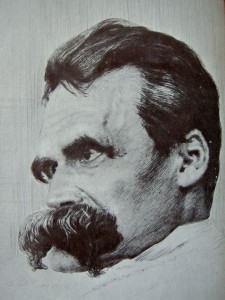
"That incipient insanity appears in many of the writings can hardly be doubted." (Image by Hans Olde.)
Announcing the death of God probably wasn’t a real consensus-builder back in the nineteenth century, so Friedrich Nietzsche took it on the chin in 1900 when he died. This postmortem, originally published in the Springfield Republican and reprinted in the November 4, 1900 Brooklyn Daily Eagle, was a scathing takedown of the extremist philosopher. An excerpt:
“The death of Friedrich Nietzsche is of no special significance to the world, because for ten years past the famous German philosopher had been in an insane asylum, the victim of the hopeless mania and paralysis, which mercifully brought death.
That incipient insanity appears in many of the writings can hardly be doubted. The brilliant gleams of intellectual insight with which they abound are obscured by great masses of nonsense, a delirium of wild and whirling words, which only the most extreme of his disciples can pretend to understand. His favorite vehicle was the aphorism; he disdained to stoop for demonstration. He might as well have said with the man in the anecdote, ‘I am not arguing–I’m just telling you.’ He likened his aphorisms to mountain peaks and said it took long legs to stride from one to the next. And the least capable of such a stride are those who have the habit of stopping to look where they leap.
Nietzsche’s philosophy is too extravagant and Teutonic to have gained much vogue outside of Germany, but it might very well be the fin de siecle philosophy of the civilized world. It represents the extreme swing of the pendulum away from Christianity. Two things made Nietzsche foam at the mouth, Wagnerism and Christianity. His special detestation was the altruism on which Christianity is founded. His ideal man was the ‘blonde brute,’ as he called him, the magnificent, untamed animal, pitiless, ruling by the right of strength, robbing, killing, regardless of others, joyous and exultant in unbridled egotism. Altruism he hated because it was the religion of the weak and sickly, a religion, he thought, pulling men down to the common level, preventing the development of the ‘beyond-man,’ as he fanatically called his ideal brute. The weak, the halt and the blind, the sick and the unfortunate touched not his sympathies. Away with such rubbish–the refuse of the race.
What profound irony in the fact that this upholder of such savage doctrines spent his last years, helpless and imbecile, in one of those kindly retreats which the religion he despised has given the world!”
Tags: Friedrich Nietzsche
